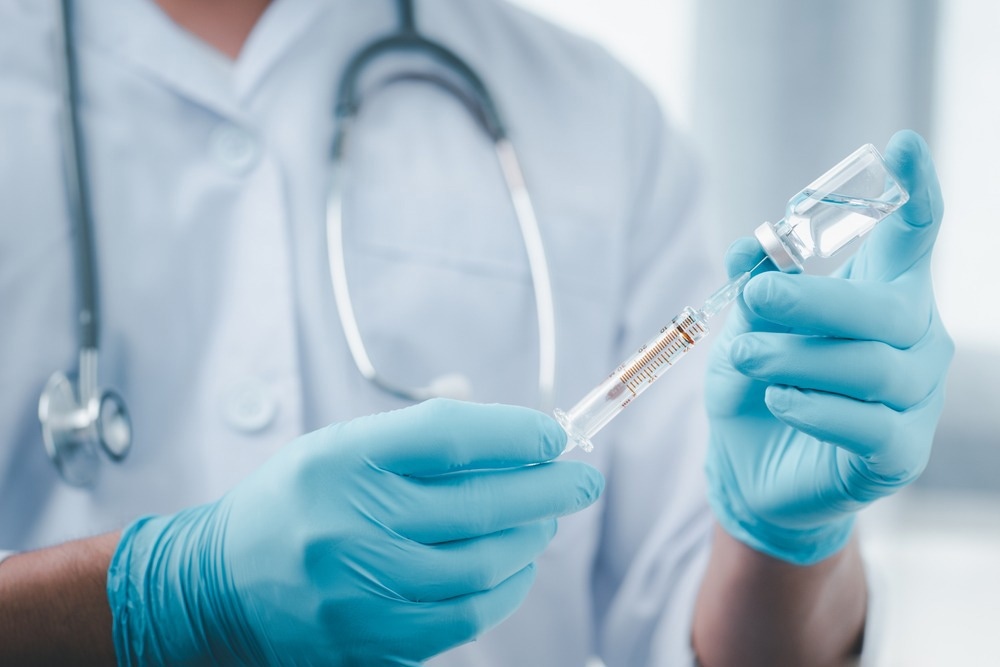
 *Important notice: medRxiv publishes preliminary scientific reports that are not peer-reviewed and, therefore, should not be regarded as conclusive, guide clinical practice/health-related behavior, or treated as established information.
*Important notice: medRxiv publishes preliminary scientific reports that are not peer-reviewed and, therefore, should not be regarded as conclusive, guide clinical practice/health-related behavior, or treated as established information.
In a recent study posted to the medRxiv* preprint server, researchers compared the efficacy of a third coronavirus disease 2019 (COVID-19) vaccine dose and that of homologous and heterologous regimens.

Background
To curb severe acute respiratory syndrome coronavirus 2 (SARS-CoV-2) transmission and mitigate the reduction in antibody levels after immunization, a third vaccination dosage has been advised for the general population. Initially, multiple vaccine regimens were implemented while the heterologous ChadOx1-S/BNT162b2 regimen demonstrated superior effectiveness and immunogenicity compared to the homologous BNT162b2/BNT162b2 schedule. Observational studies also imply that a third dosage provides significantly greater protection against symptomatic illness than two doses.
About the study
In the present study, researchers examined the SARS-CoV-2 spike-specific immunity as well as protection against COVID-19 infection provided by the second and third COVID-19 messenger ribonucleic acid (mRNA) vaccine doses.
The team performed SARS-CoV-2 detection in healthcare workers (HCWs) vaccinated with one dose of either mRNA vaccine or ChAdOx1-S. To evaluate the prevalence of SARS-CoV-2 variants of concern (VOCs) in an HCW, sequencing analysis was performed on all available positive samples having Ct less than 28. Demographic data were obtained from the occupational medicine database at the University Hospital of Lyon, France.
During the study period, 13,489 HCWs employed at Hospices civils de Lyon were included. The epidemiological analysis only included participants with no history of COVID-19 infection who were vaccinated with an mRNA vaccine or ChAdOx1-S-nCoV-19 and were vaccinated with the second or third mRNA vaccine dose.
To analyze the risk of infection in various subject groups, the study cohort included breakthrough infections confirmed by either positive reverse transcription–polymerase chain reaction (RT-PCR) or antigenic testing after December 15, 2021, and a minimum of seven days following vaccination.
The study cohort involved 88 COVID-19-naive HCWs immunized with BNT, mRNA-1273, and/or ChAd vaccines. Before vaccination, before and four weeks post-second and third vaccine doses, blood samples were collected. The team confirmed the absence of any prior COVID-19 infection. Immunoglobulin (Ig)-G antibodies specific to the SARS-CoV-2 receptor-binding domain (RBD) were tested. A plaque reduction neutralization test (PRNT) was employed to identify and titrate neutralizing antibodies.
Results
The study results showed that heterologous vaccination regimens provided greater protection against infection after the second immunization dose than homologous vaccination regimens. Those immunized with mRNA vaccines were twice likelier to be infected than those inoculated with ChAdOx1-S after primary mRNA vaccination.
In both the vaccination cohorts, the number of illnesses was lower after the third dosage than after the second, demonstrating the efficacy of the booster dose. In addition, inverting the infection incidence curves revealed that the third dose of the homologous cohort provided at least the same amount of protection as observed for the third dose of the heterologous cohort.
The heterologous combination of ChAdOx1-S/COVID-19 mRNA vaccines protected against SARS-COV-2 infection more effectively than the homologous combination of the COVID-19 mRNA vaccine. However, the third dose equalized the effectiveness of both vaccination regimens. In patients vaccinated as per the homologous schedule, the anti-RBD IgG level assessed four weeks after the second dosage was considerably lower than that recorded four weeks after the third dose, whereas no difference was noted in subjects immunized as per the heterologous schedule.
In the homologous vaccination cohort, the antibody neutralization capacity four weeks after the third dosage was at least three-fold more than that observed four weeks after the second dose. On the other hand, no improvement in neutralizing ability was noted against Delta and 19A four weeks after the third dosage in heterologous immunized individuals.
Four weeks after the third dose, the neutralization ability of total antibodies elicited against Omicron doubled compared to four weeks after the second dose. The team noted no variation between anti-SARS-CoV-2 Ig levels four weeks after the third dose in HCWs vaccinated with BNT162b2 or mRNA-1273 booster vaccination.
Conclusion
Overall, the study findings showed that third vaccination with a COVID-19 mRNA vaccine equalizes the effectiveness levels of homologous or heterologous COVID-19 vaccine regimens. The study also provided evidence to estimate the number of vaccine boosts required to achieve maximum protection against SARS-CoV-2 in heterologous or homologous vaccination strategies. Further research is required to evaluate if another vaccine type should be administered to increase SARS-CoV-2 immunity further.

 *Important notice: medRxiv publishes preliminary scientific reports that are not peer-reviewed and, therefore, should not be regarded as conclusive, guide clinical practice/health-related behavior, or treated as established information.
*Important notice: medRxiv publishes preliminary scientific reports that are not peer-reviewed and, therefore, should not be regarded as conclusive, guide clinical practice/health-related behavior, or treated as established information.
https://news.google.com/rss/articles/CBMipAFodHRwczovL3d3dy5uZXdzLW1lZGljYWwubmV0L25ld3MvMjAyMzAyMjMvSXMtdGhlLWFkdmFudGFnZS1jb25mZXJyZWQtYnktdGhlLWhldGVyb2xvZ291cy1yZWdpbWVuLWNvbnNlcnZlZC1hZnRlci1hLWJvb3N0ZXItZG9zZS1vZi1tUk5BLWJhc2VkLUNPVklELTE5LXZhY2NpbmUuYXNweNIBqAFodHRwczovL3d3dy5uZXdzLW1lZGljYWwubmV0L2FtcC9uZXdzLzIwMjMwMjIzL0lzLXRoZS1hZHZhbnRhZ2UtY29uZmVycmVkLWJ5LXRoZS1oZXRlcm9sb2dvdXMtcmVnaW1lbi1jb25zZXJ2ZWQtYWZ0ZXItYS1ib29zdGVyLWRvc2Utb2YtbVJOQS1iYXNlZC1DT1ZJRC0xOS12YWNjaW5lLmFzcHg?oc=5
2023-02-23 13:35:00Z
CBMipAFodHRwczovL3d3dy5uZXdzLW1lZGljYWwubmV0L25ld3MvMjAyMzAyMjMvSXMtdGhlLWFkdmFudGFnZS1jb25mZXJyZWQtYnktdGhlLWhldGVyb2xvZ291cy1yZWdpbWVuLWNvbnNlcnZlZC1hZnRlci1hLWJvb3N0ZXItZG9zZS1vZi1tUk5BLWJhc2VkLUNPVklELTE5LXZhY2NpbmUuYXNweNIBqAFodHRwczovL3d3dy5uZXdzLW1lZGljYWwubmV0L2FtcC9uZXdzLzIwMjMwMjIzL0lzLXRoZS1hZHZhbnRhZ2UtY29uZmVycmVkLWJ5LXRoZS1oZXRlcm9sb2dvdXMtcmVnaW1lbi1jb25zZXJ2ZWQtYWZ0ZXItYS1ib29zdGVyLWRvc2Utb2YtbVJOQS1iYXNlZC1DT1ZJRC0xOS12YWNjaW5lLmFzcHg
Bagikan Berita Ini














0 Response to "Is the advantage conferred by the heterologous regimen conserved after a booster dose of mRNA-based COVID-19 vaccine? - News-Medical.Net"
Post a Comment